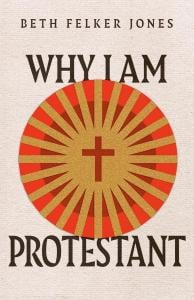And Can It Be?
Beth Felker Jones is a Methodist theologian whom I have known for years and whom I respect greatly. We first met at Duke when I was the “preceptor” (teaching assistant) for an intro church history class she was taking. I was a Ph.D. student and she was pursuing a master’s degree at the time, so it was my job to grade her papers. I took exception to her ending a paper on St. Augustine with quoting the entirety of Charles Wesley’s hymn “And Can It Be” and struck through the text of the hymn with red pen, saying that this was too long and not sufficiently relevant. That is to say, I thought that she was jumping from the fourth century to the eighteenth and reading pietistic Protestantism into Augustine. And as an arrogant young Ph.D. student, I thought that was the sort of thing I was supposed to be rooting out of the students at Duke Divinity School.
In spite of this inauspicious beginning, Beth and I have been friends for more than a quarter of a century now. I have learned far more from her than she from me. Indeed, she is one of several people I knew at Duke who taught me to rediscover the beauty of my own Wesleyan heritage. And so for twenty-five years I, like Beth, have been engaged in thinking about how Wesleyan evangelicalism relates to the faith of the early Church. When Beth was working on her book Marks of His Wounds, based on her dissertation, she sent me the chapter on Augustine for comments. And, once again, I disagreed–more respectfully that time, I hope. In that case it seemed to me that Beth was making Augustine more of a feminist than he was.
Charitable polemic
I mention this because in reading her most recent book, Why I Am a Protestant, I find that once again I’m arguing with her about Augustine. But more about that later. First some general comments about the book. It is part of an “Ecumenical Dialogue” series published by InterVarsity. The Catholic volume, by Matthew Levering, has already been published, though I have not yet read it, and there will be an Orthodox volume at some point. (Matthew is also a friend of mine from Duke, as it happens.) The purpose is for theologians from each tradition to “address the challenges and benefits” of the form of Christianity to which they adhere.
In keeping with the ecumenical, charitable purpose of the series, Beth’s book is generally not polemical and is generous in its recognition of the beauty and value of Catholic and Orthodox Christianity. Her first chapter is a beautiful exposition of the common heritage of “small o orthodox” Christianity shared by Protestants, Catholics, and Orthodox, focusing on the Trinitarian and Christological dogmas. Since she highlights the Ecumenical Councils, this does raise the question of how her staunch adherence to this common orthodoxy squares with her later disparagement of sharp doctrinal boundaries and institutional definitions of “the true Church.” But more on that later.
Between charity and polemic
The rest of the book is an argument that in spite of its problems (which on the whole she rather minimizes, from my admittedly biased perspective), Protestantism embodies this common Christian faith just as well as–even better than–Catholicism and Orthodoxy. Thus, she does become somewhat polemical, though never in an overly harsh way (honestly there are criticisms she could have made more strongly than she does), in order to make the case that there are defects in Catholicism and Orthodoxy that correspond to strengths in Protestantism.
Inevitably, given the history of Protestantism as a rejection of certain aspects of medieval Catholicism, she has to make such an argument in order to establish Protestantism as a viable alternative. The major weakness of the book, as I see it, is that the tension between ecumenism and the need to make a polemical case results in a great deal of vagueness. She often gives with one hand and takes away with the other. For her to make the case for Protestantism she wants to make, she needs to be able to condemn Catholicism more harshly than she is willing to do. (Naturally, I agree with her refusal to do so since, like her, I don’t think that more overtly polemical kind of Protestant argument holds up.)
Sola fide
The two classic pillars of Protestantism are “sola fide” and “sola scriptura.” Beth affirms both, but in a rather qualified way. She speaks a lot more about sola scriptura than sola fide, so I’ll start with sola fide and get it out of the way.
She affirms in several places that Protestants proclaim grace more clearly and effectively than Catholics do. This of course is a common claim. In some contexts and in some ways I think it’s actually a true claim. Certainly many people have heard a legalistic message of salvation in Catholicism, and many aspects of Catholic doctrine and practice can lend themselves to that distortion. That’s all Beth really claims. In fact she mostly focuses on late medieval Catholicism against which Luther reacted, and what she says about it is pretty uncontroversial: “But–in at least some circles in late medieval Roman Catholicism–that teaching [Augustine’s teaching which she says comes from Paul] was being distorted in ways that offered a false gospel to the people of God.” She goes on to say that “Late medieval Roman Catholicism . . . was never without grace.” (34)
Imputation–important or not?
I appreciate her generosity here, and obviously as a Catholic I agree. But without doubling down on a specific doctrinal claim on which she thinks Catholicism is erroneous, this is a fairly weak basis for justifying what actually happened in the Reformation. Luther and his followers believed that “Rome” was denying the Gospel. They hammered out specific doctrinal criticisms that isolated where they thought Rome went wrong. The key claim was that justification and sanctification have to be regarded as distinct, with justification defined as God’s declaration that we are righteous based on the imputation of Christ’s righteousness, and sanctification as the process of actually making us righteous. (Actually that second part is more of a Reformed way of putting it–Luther himself, as far as I can recall, doesn’t speak of sanctification in quite this way though he certainly says that good works will flow from faith.)
Beth summarizes this position on p. 105, drawing on Alister McGrath’s account of it in his Iustitia Dei. (She doesn’t mention McGrath’s acknowledgment that this understanding of justification was a “theological novum” and not found in Augustine. See Melanchthon’s admission of that here.) And then she affirms it in a rather lukewarm way: she doesn’t “reject” it, she finds it “valuable,” and “it describes what I too profess.” But then she goes on to say that she finds it a bit too “casuistic,” and that as a Wesleyan she never heard the term “imputation” until she went to grad school.
Now I agree with Beth that Wesleyans do not think about imputation in the same way Lutherans and Reformed do. I also come from a Wesleyan background and unlike Beth I did hear about imputation because I was surrounded by Southern Baptists. I remember when my grandmother listened to a tape of a preacher saying that “when God looks at me he sees Jesus,” and she was horrified. She thought, as Wesley thought, that a full-blown affirmation that Jesus’ righteousness is legally imputed to us makes God a liar. Later on I ran into dogmatic Calvinists who insisted that imputation was absolutely central to the Gospel. And then when I read the canons of Trent, I thought, “this isn’t so different from what I was taught as a Wesleyan.”
So do we actually need Protestantism?
Beth wants to make a staunch, unapologetic defense of Protestantism in general. But on this issue, she’s admitting that she’s rather lukewarm about key elements in classic Protestant soteriology–some of the key points that Lutherans and Reformed would say explain why “Rome” is in error. If these doctrinal niceties don’t actually matter that much, then the claim that we need Protestantism to uphold grace properly doesn’t have a lot of weight behind it.
I’ve spent too long on this, since Beth doesn’t really emphasize the soteriological issues in the book. She spends much more time on ecclesiology. I welcome that emphasis. Ecclesiology was perhaps the central issue driving me to Catholicism, but it was also one of my major difficulties with Catholicism. And it continues to be so. Hence, I’m sympathetic to Beth’s overall argument for the legitimacy of Protestant forms of the Church and the need for diversity within the Church. However, I’m fundamentally in disagreement with many things she argues. Unfortunately, this is going to have to be a second blog post.












